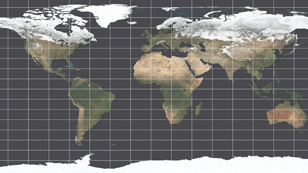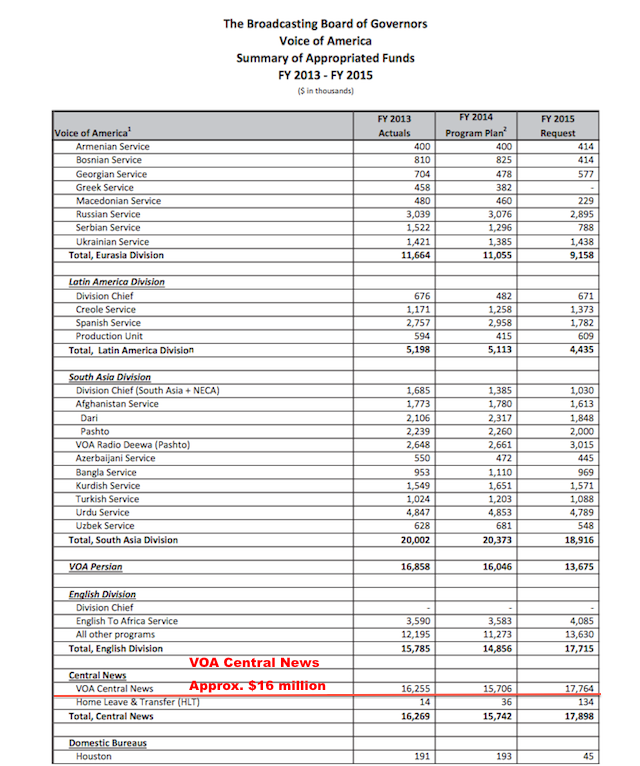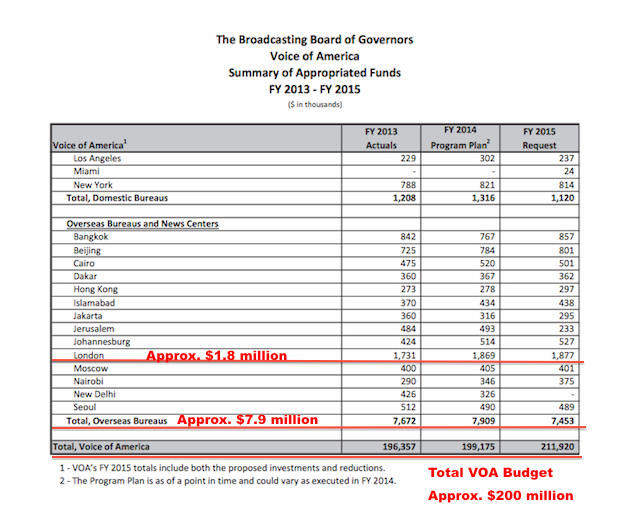BBG Watch Guest Commentary
BBG Watch occasionally publishes guest commentaries. This one is from MC, a longtime Voice of America radio listener and reader of its English news website, who currently lives in the United Kingdom.
Views expressed here are only those of the author and not of BBG Watch, its volunteers, or sponsors.
We invite those with opposing views and others who want to comment on this or other issues followed by BBG Watch to submit their op-eds for consideration.
 According to a program description the Voice of America website, VOA’s “International Edition gives you 30 minutes of in-depth world news reported by VOA’s worldwide corps of correspondents – on the events people are talking about. Updated 10 times a day.”
According to a program description the Voice of America website, VOA’s “International Edition gives you 30 minutes of in-depth world news reported by VOA’s worldwide corps of correspondents – on the events people are talking about. Updated 10 times a day.”
But does the Voice of America deliver on radio or on its website what it promises to deliver? – “in-depth world news reported by VOA’s worldwide corps of correspondents.”
MC, our occasional contributor in the UK who prefers to remain anonymous, has sent us observations on Voice of America news reporting. Many of his observations happen to match ours.
Voice of America correspondent reports are now much less common on VOA English radio news programs and on the VOA English news website than they were several years ago before the current senior management took over, even though VOA still has several overseas news bureaus. They cost U.S. taxpayers almost $8 million a year. In addition, VOA still has a few domestic news correspondents.
The VOA Central English News Division annual budget is approximately $16 million. Our commentator observed that only there were no reports from Voice of America foreign correspondents included in the 17:05 UTC International Edition VOA program on March 11, but the program had only one U.S.-based expert commenting on news developments. Three other experts who were interviewed were from outside of the United States. They were not even from countries where news events being discussed were taking place, or to which VOA primarily directs its news programs.
“Additionally, the outside experts (one each in Canada, Australia, and the U.K.) had less of an American angle than I would have expected from The Voice of America,” our commentator wrote.
Our commentator made these observations shortly after Broadcasting Board of Governors (BBG) director and CEO Andy Lack had left his post after only a few weeks on the job. The BBG oversees the operations of the Voice of America and other U.S. taxpayer-funded media entities serving audiences abroad.
A decline in posting Voice of America correspondent reports online and using them on radio had started under the current senior VOA management several years before Andy Lack’s arrival.
There may have been a slight improvement in foreign and U.S. news coverage on the VOA English website while Andy Lack was briefly at the agency in an apparent effort by VOA managers to impress him, but as soon as he left the job, things seem to have gone back to the way they were before.
While several VOA correspondent reports were posted online on March 11, very few were posted before 17:00 UTC. Most were posted during the night in Europe, Africa, Middle East and parts of Asia.
Where have all the Voice of America correspondents gone?
By MC, A Voice of America Radio Listener and Web User Abroad
On March 11th, I listened to Voice of America daily news analysis programme “International Edition” (on the VOA Worldwide English internet radio stream) and heard something I’ve haven’t heard before in more than 25 years of listening to VOA English – a news programme which didn’t contain a single report from a VOA overseas correspondent – not one.
In fact, the programme only included one report from a VOA correspondent in the field at all – from a staff correspondent at the New York City bureau, right at the end of the programme, on how satire is being used to combat ISIS/ISIL.
March 11th wasn’t a slow news day, and “International Edition” (the 17.05 UTC edition) reflected this in the stories it covered – the recent assassination of Boris Nemtsov in Moscow, violent demonstrations in Burma, ISIS’s continuing ability to recruit new fighters, the ongoing fighting across Libya, and battling ISIS through humour.
For most of the time I’ve been a VOA listener, these stories would have been covered by reports from VOA staff correspondents at the Moscow, Bangkok, Cairo bureaus and so on. However, on March 11th only the ISIS/satire report was covered by a correspondent report, from New York.
The lead story – is the Russian government responsible for the Nemtsov murder? – was covered solely by a phone interview between the show’s Washington-based anchor, and an academic expert at Columbia University [who misspoke about Nemtsov’s and Putin’s previous government jobs and was not corrected by the VOA host.]
The story on violence by Burmese police against student demonstrators was covered by an audio clip from U.S. State Dept spokesperson Jen Psaki, and then a phone interview by a different Washington anchor/editor, this time with an academic expert at Macquarie University in Australia (so not at an American university).
ISIS’s continuing ability to find recruits from across the Middle East was covered by another phone interview by the Washington anchor and an academic expert, this time, one at Simon Frazier University in Vancouver, Canada (so, again, not at an American university).
The Libya ceasefire negotiations were covered by another phone interview, this time between a Washington-based reporter, and an expert at ‘Libya-analysis.com’ – based in London (so not a U.S. based expert).
Finally, 19 minutes into a 25 minute-long news programme, came the first and only report from a VOA correspondent in the field – from Adam Phillips in New York City, on how satire is being used against ISIS. No VOA correspondents outside the U.S.A. made it onto the show.
Why were the ever-reducing number of VOA correspondents around the world not used to cover any stories? VOA Central News is clearly struggling to cover all the ongoing events in Russia/Ukraine and the Middle East from its four bureaus across those regions (soon to be three when Jerusalem closes – compared to nine bureaus across those two regions in the 1980s).
But to have a 25 minute VOA news programme go on air with not a single report from a VOA correspondent outside the U.S.A – well, it’s not how VOA used to cover the news in its heyday. It was surprising, considering the show covered events in Russia, South-East Asia, and the Middle East/North Africa – all places where VOA still maintains Central News bureaus.
Are all the VOA overseas correspondents too busy doing VOA TV packages to be able to do a radio report? Or doing special reports or two-ways for various local VOA affiliates? Or is it because so few VOA news programmes go out live – are they recorded early in the day before many correspondents reports come in? Or is VOA management trying to show it’s possible to cover the news with still fewer overseas correspondents, to justify further bureau closures after Jerusalem?
Additionally, the outside experts (one each in Canada, Australia, and the U.K.) had less of an American angle than I would have expected from The Voice of America.
I attach a link to the March 11th edition of “International Edition” here, from the VOA website:
http://www.voanews.com/audio/2676207.html
###



Comments are closed.